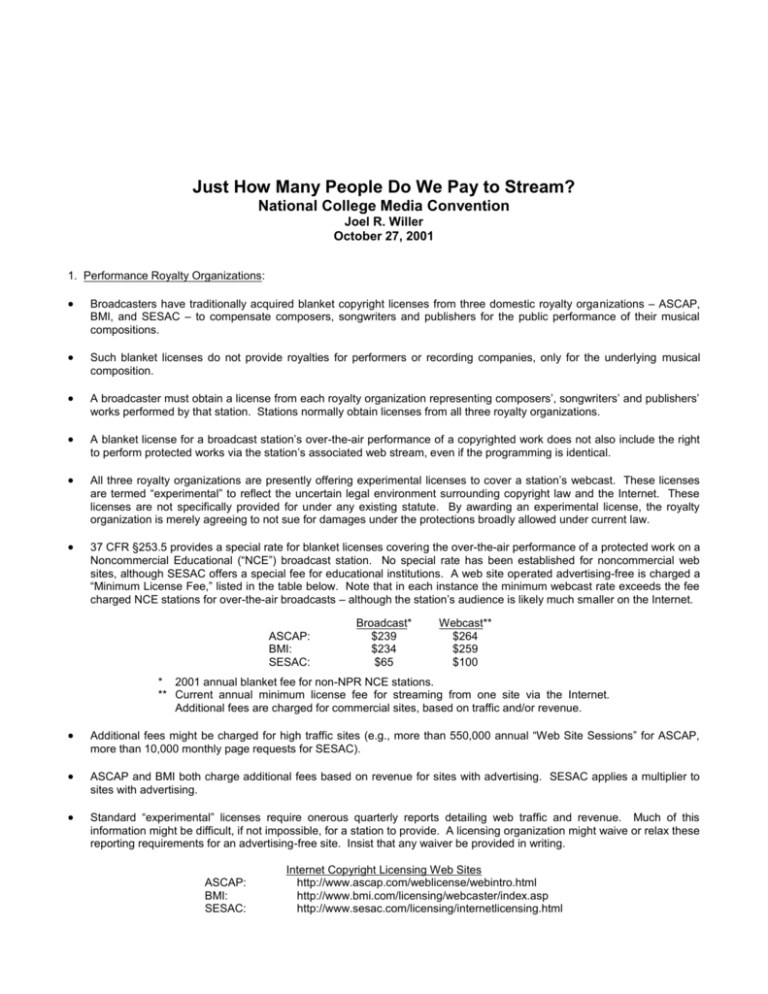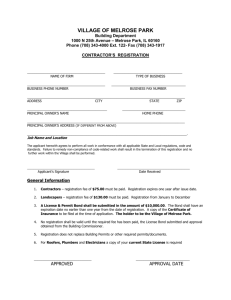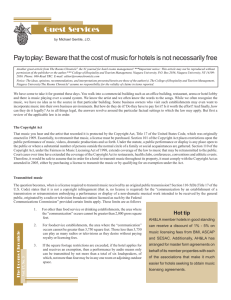Just How Many People Do We Pay to Stream
advertisement

Just How Many People Do We Pay to Stream? National College Media Convention Joel R. Willer October 27, 2001 1. Performance Royalty Organizations: Broadcasters have traditionally acquired blanket copyright licenses from three domestic royalty organizations – ASCAP, BMI, and SESAC – to compensate composers, songwriters and publishers for the public performance of their musical compositions. Such blanket licenses do not provide royalties for performers or recording companies, only for the underlying musical composition. A broadcaster must obtain a license from each royalty organization representing composers’, songwriters’ and publishers’ works performed by that station. Stations normally obtain licenses from all three royalty organizations. A blanket license for a broadcast station’s over-the-air performance of a copyrighted work does not also include the right to perform protected works via the station’s associated web stream, even if the programming is identical. All three royalty organizations are presently offering experimental licenses to cover a station’s webcast. These licenses are termed “experimental” to reflect the uncertain legal environment surrounding copyright law and the Internet. These licenses are not specifically provided for under any existing statute. By awarding an experimental license, the royalty organization is merely agreeing to not sue for damages under the protections broadly allowed under current law. 37 CFR §253.5 provides a special rate for blanket licenses covering the over-the-air performance of a protected work on a Noncommercial Educational (“NCE”) broadcast station. No special rate has been established for noncommercial web sites, although SESAC offers a special fee for educational institutions. A web site operated advertising-free is charged a “Minimum License Fee,” listed in the table below. Note that in each instance the minimum webcast rate exceeds the fee charged NCE stations for over-the-air broadcasts – although the station’s audience is likely much smaller on the Internet. ASCAP: BMI: SESAC: Broadcast* $239 $234 $65 Webcast** $264 $259 $100 * 2001 annual blanket fee for non-NPR NCE stations. ** Current annual minimum license fee for streaming from one site via the Internet. Additional fees are charged for commercial sites, based on traffic and/or revenue. Additional fees might be charged for high traffic sites (e.g., more than 550,000 annual “Web Site Sessions” for ASCAP, more than 10,000 monthly page requests for SESAC). ASCAP and BMI both charge additional fees based on revenue for sites with advertising. SESAC applies a multiplier to sites with advertising. Standard “experimental” licenses require onerous quarterly reports detailing web traffic and revenue. Much of this information might be difficult, if not impossible, for a station to provide. A licensing organization might waive or relax these reporting requirements for an advertising-free site. Insist that any waiver be provided in writing. ASCAP: BMI: SESAC: Internet Copyright Licensing Web Sites http://www.ascap.com/weblicense/webintro.html http://www.bmi.com/licensing/webcaster/index.asp http://www.sesac.com/licensing/internetlicensing.html Just How Many People Do We Pay to Stream? Joel R. Willer Page 2 of 2 October 27, 2001 2. DMCA Statutory License: Among the provisions of the Digital Millennium Copyright Act of 1998 (“DMCA”) was a new statutory license to provide royalties, with regard to digital media, for recording artists and record companies. The previous blanket license, discussed on the first page of this summary, only covers performances of the underlying composition (composer, songwriter and publisher); this new license applies to the actual recording (performer and label). These two distinct concepts are often confused. The new DMCA statutory license fee, unless overturned by Congress or the courts, will be in addition to the ASCAP, BMI, and SESAC fees. Broadcast stations have not heretofore financially compensated performers and record companies. The DMCA statutory license does not apply to a broadcaster’s existing analog transmission. The Digital Performance Right in Sound Recordings Act of 1995 (“DPRA”) specifically exempts traditional over-the-air broadcasts, even in digital form, from new copyright royalties paid to recording artists and record companies. Potential future terrestrial digital transmissions will therefore be protected from the DMCA statutory license fee. The U.S. Copyright Office and federal courts have ruled that the DMCA does apply to a broadcast station’s webcast, even if the streamed programming duplicates the station’s over-the-air material. That ruling is subject to continuing legal appeal and legislative efforts. The DMCA clearly includes web-only operations. A station that plans to stream must state its intent to obtain a DMCA statutory license by filing a “Notice of Digital Transmission of Sound Recordings under Statutory License” with the Copyright Office. The notice must be accompanied by a $20 filing fee. The on-going fee for the statutory license has yet to be determined. A Copyright Arbitration Royalty Panel (“CARP”) is due to release a recommended fee structure early in 2002. Several proposed fee structures are based on measured streaming traffic. It is likely that broadcasters will be required to pay fees for streaming retroactive to the 1998 date the DMCA became law. The DMCA statutory fees will be administered through Sound Exchange, an unincorporated division of the Recording Industry Association of America, Inc. (“RIAA”). In addition to the license fee, the DMCA imposes programming restrictions on interactivity, prior announcement of an upcoming song, the number of songs played consecutively from one artist or recording, the number of songs played within a three-hour period from one artist or recording, program archiving on the web, and more. Related Web Sites U.S. Copyright Office: http://www.loc.gov/copyright/licensing Notice of Intent Form: http://www.loc.gov/copyright/licensing/notice.pdf RIAA: http://www.riaa.com/Music-Rules-3.cfm Will Robedee’s Streaming Information: http://www.ruf.rice.edu/~willr/cb 3. Program Providers: Some program providers (networks, syndicators, wire services) impose a surcharge on material streamed over the Internet. Others specifically prohibit the streaming of their programming. Policies vary widely. A “don’t ask, don’t tell” policy is applied by some networks and program syndicators. For the time being these suppliers are perfectly satisfied to not know about your streaming activity. Once the legal climate becomes more settled these providers will probably change their practices. Associated Press is now requiring a supplemental streaming agreement for which it charges an additional fee of 15% of the cost of any wire and/or audio service(s). 4. Union Talent: Current American Federation of Television and Radio Artists (“AFTRA”) union contracts require payment of additional talent fees, amounting to 300% of the initial session fee, for broadcast commercials used on the Internet. This provision has resulted in many commercial stations pulling their streams or replacing on their web streams commercials performed by union talent. This situation obviously does not normally apply to NCE stations.



